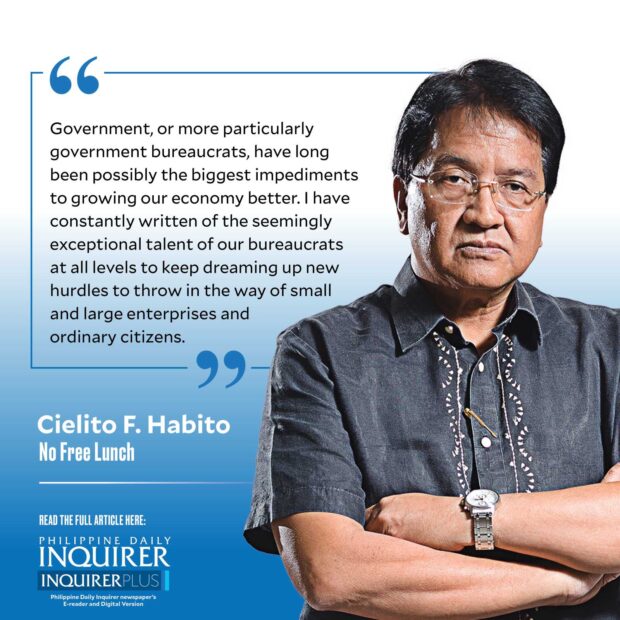A government that helps
 As in past years, the Philippines ended 2022 with the least inflows of job-creating foreign direct investments (FDI) among its Asean peers. Comparative data from the Bangko Sentral ng Pilipinas (BSP) show that we drew in $9.2 billion against Thailand’s $10.2, Malaysia’s $15.1, Vietnam’s $17.9, Indonesia’s $21.4, and Singapore’s whopping $140.8 billion. This year, the numbers are even more dismal: our FDI inflows dropped 22 percent in the first quarter (Q1) of this year from the same period a year ago, and by 20.4 percent (from $4.9 billion to $3.9 billion) in the first half. The BSP blames it on “investor concerns over weak growth prospects amid persistent global uncertainties.”
As in past years, the Philippines ended 2022 with the least inflows of job-creating foreign direct investments (FDI) among its Asean peers. Comparative data from the Bangko Sentral ng Pilipinas (BSP) show that we drew in $9.2 billion against Thailand’s $10.2, Malaysia’s $15.1, Vietnam’s $17.9, Indonesia’s $21.4, and Singapore’s whopping $140.8 billion. This year, the numbers are even more dismal: our FDI inflows dropped 22 percent in the first quarter (Q1) of this year from the same period a year ago, and by 20.4 percent (from $4.9 billion to $3.9 billion) in the first half. The BSP blames it on “investor concerns over weak growth prospects amid persistent global uncertainties.”
But how much of the decline is really external and beyond our control? Our comparable neighbors have mostly reported higher FDI inflows in Q1, or modest declines at worst. Hence, our substantial drop suggests that more of it may be self-inflicted—and this holds for foreign and domestic investors alike. What this means is that up or down, government has a lot to do with our economy’s performance lately. The economy’s overall slowdown in Q2, in fact, traced clearly to government actions, or lack thereof, in both direct and indirect ways.
Directly, it slowed down the economy with its dramatic spending decline in Q2, when government consumption expenditures fell by 5.2 percent from the first quarter, and by 7.1 percent from the same quarter last year. Meanwhile, Q2 government infrastructure spending ground down to a near halt of 0.8 percent, compared to a 5.1-percent increase in the previous quarter and 24.4 percent a year ago. This cutback must have been induced by the already high level of public debt, last reported at 63 percent of our GDP and beyond the rule-of-thumb safe threshold of 60 percent. As such, government has defaulted on its textbook “pump-priming” role that is otherwise called upon when spending in the rest of the economy is weak.
Indirectly, government’s continued failures in agriculture coupled with a long misguided restrictive trade policy have speeded up supply-side inflation that forces the BSP into using demand-side monetary tools like raising interest rates, further choking an already slowing economy. One gets the sinking feeling that we’re doing everything wrong at the worst of times.
But it’s not only now. Government, or more particularly government bureaucrats, have long been possibly the biggest impediments to growing our economy better. I have constantly written of the seemingly exceptional talent of our bureaucrats at all levels to keep dreaming up new hurdles to throw in the way of small and large enterprises and ordinary citizens. The sheer number of permits, clearances, and licenses that an enterprise must obtain from various regulatory agencies, often wrongly named as a “development authority” when they’re anything but developmental, stops too many would-be entrepreneurs in their tracks. Years ago, I was part of a study to take stock of all the clearances, licenses, and permits required for thousands of import products by various government agencies well beyond the Bureau of Customs (BoC). We found far too many of them to be outdated, redundant, overlapping, or outright pointless. A classic example was color photocopying machines, which needed separate clearances from the Bureau of Philippine Standards, the National Telecommunications Commission (if Wi-Fi enabled), and—guess what—the National Bureau of Investigation, on the misplaced fear that these machines could counterfeit money. Then BoC Commissioners Sunny Sevilla and Bert Lina spearheaded a coordinative effort among dozens of such trade regulatory government agencies toward unifying, streamlining, and abolishing those unnecessarily burdensome requirements. But the initiative fizzled out as the perpetually revolving doors of the BoC leadership kept turning.
Last week, a memorandum of understanding was signed by the Anti-Red Tape Authority (Arta), Department of Information and Communications Technology (DICT), Department of the Interior and Local Government (DILG), and Management Association of the Philippines (MAP) on a collaboration to pursue ease of doing business with greater vigor. DICT will facilitate digitalization to minimize the need for face-to-face contacts in government transactions, which tend to give rise to bribery opportunities. DILG is important because many of the hurdles to business are imposed by short-sighted local governments. With MAP providing valuable private sector support, the collaboration is hoped to help Arta fulfill its mandate to achieve a government that helps, not hinders, economic activities that would provide jobs and incomes to the greatest number of Filipinos.
cielito.habito@gmail.com




















